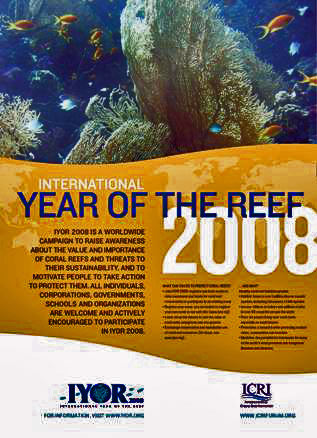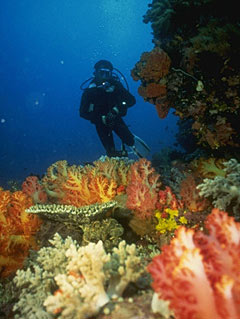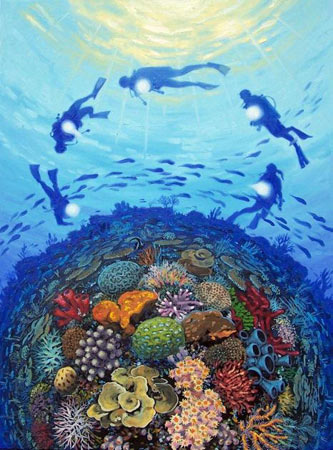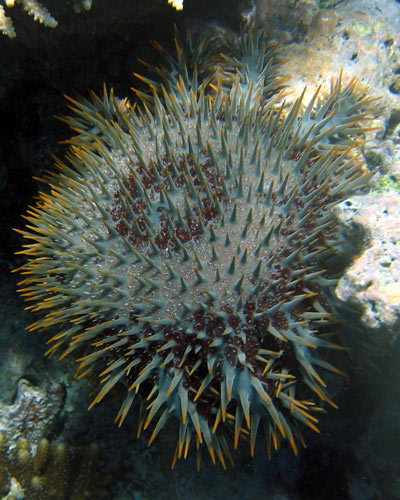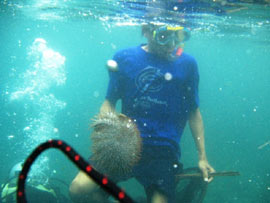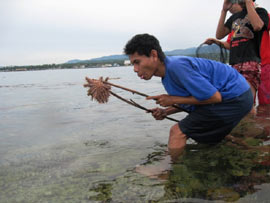|
Even if you don't live near a reef, you can help protect coral reefs in the U.S.A. and around the world.
Educate yourself about coral reefs and the creatures they support. How many different species live in reefs? What new medicines have been developed from reef organisms? Participate in training or educational programs that focus on reef ecology. When you further your own education, you can help others understand the fragility and value of the world’s coral reefs.
Don’t use chemically enhanced pesticides and fertilizers. Although you may live thousands of miles from a coral reef ecosystem, these products end up in the watershed -- the area that drains to a common waterway, such as a stream, lake, estuary, wetland, and ultimately, the ocean.
Recycle. This helps keep trash out of the oceans and also out of landfills where it can have an adverse impact on the water quality of our rivers and oceans.
Be an informed consumer. Only buy marine fish and other reef organisms when you know they have been collected in an ecologically sound manner. Ask store managers where the organisms come from and how they were collected. Does the country have a management plan to insure the harvest was legal and sustainable over time? For more information on how to find sustainably harvested reef fish, go to www.aquariumcouncil.org.
Be a wastewater crusader! Make sure that sewage from your boat and home is correctly treated. Excess nutrients in wastewater can negatively impact coral reef ecosystems.
Be a marine debris crusader! In addition to picking up your own trash, carry away the trash that others have left behind. More than just an unsightly nuisance, beach litter poses a significant threat to the health and survival of marine organisms, which can swallow or get tangled in beverage containers, plastic bags, six-pack rings, and other debris.
Conserve water. The less water you use, the less runoff and wastewater eventually find their ways back into the oceans.
Support organizations that protect coral reefs. Many groups have coral reef programs, and your support will make a big difference.
Volunteer for a reef cleanup. You don’t live near a coral reef? Then consider visiting a coral reef on your next vacation. Spend an afternoon enjoying the beauty of one of the world’s treasures while helping to preserve it for future generations.
Visit your local aquarium or zoo. Ask what they are doing and how you can help conserve our coral reefs. The answer may pleasantly surprise you. Visit the American Zoo and Aquarium Association (AZA) to find a zoo or aquarium near you.
If you dive, don’t touch! Take only pictures and leave only bubbles. Keep your fins, gear, and hands away from the reef, as this contact can hurt you and will damage the delicate coral animals. Stay off the bottom because disturbed sediments can smother the corals.
Support reef-friendly businesses. Ask what your dive shop, boating store, tour operator, hotel and other coastal businesses are doing to save coral reefs. This is especially important in coastal areas with reefs. Let them know you are an informed consumer and care about reefs.
Become a volunteer monitor! Participate in community coral reef monitoring programs. If you do not live near a coast, get involved in protecting your watershed.
Report dumping or other illegal activities. Help be the eyes and ears of the reef! Your involvement can make a big difference.
Hire local guides when visiting coral reef ecosystems. This will help you learn about local resources, and protect the future of the reef by supporting the local economy.
Respect local guidelines when you visit a reef. Help keep coral reefs healthy by respecting local customs, recommendations, and regulations. Ask local authorities or your dive shop how to be a reef-friendly tourist.
Don’t anchor on the reef. If you are boating near a coral reef, use mooring buoy systems when they are available.
Participate in the Great Annual Fish Count. What better way to enjoy your vacation than snorkeling or diving in America’s coral reefs? The Fish Count helps scientists better understand coral reef fish populations.
Stay informed. Find out about existing and proposed laws, programs, and projects that could affect the world’s coral reefs. Many Web sites provide information about coral reefs and what you can do to become involved.
Spread the word. Remember your own excitement at learning the value and importance of coral reef ecosystems. Sharing this excitement gets everyone involved.
|
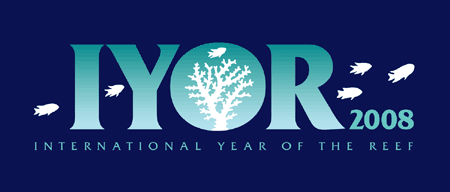 The International Year of the Reef (IYOR) 2008 was a yearlong celebration intended to increase global awareness of coral reefs and associated ecosystems and to persuade people worldwide to take actions that benefit coral reefs.
The International Year of the Reef (IYOR) 2008 was a yearlong celebration intended to increase global awareness of coral reefs and associated ecosystems and to persuade people worldwide to take actions that benefit coral reefs. 